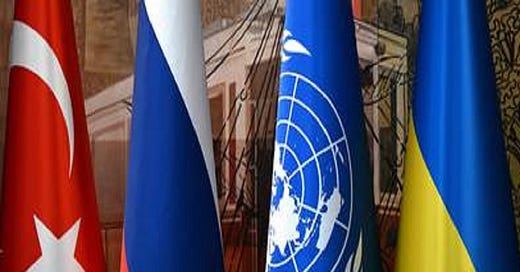In hindsight, Russia, Kiev, and the latter’s Golden Billion patrons all had differing motives in agreeing to the deal. The first regarded it as an act of good faith as well as a means of tangibly counteracting fake news alleging that the Kremlin was weaponizing famine across the Global South. The second, meanwhile, wanted to open up a maritime corridor for clandestinely receiving more weapons. And the third, while sharing that preceding objective, also wanted to buy up more Ukrainian grain for itself.
Kiev’s UK-assisted drone attack against Sevastopol on Saturday failed to achieve any of its military objectives but it did succeed in prompting Russia to indefinitely suspend its participation in the grain deal. Moscow’s explanation is that this humanitarian corridor was used as a cover for facilitating the incident, which specifically targeted those of its ships that were providing security to civilian vessels. Kiev and Washington reacted with outrage, claiming that the Kremlin wants to starve the Global South.
The reality, however, is that the grain deal was always largely superficial as evidenced by President Putin’s prior statements. He revealed as recently as late September that “They are exporting grain from Ukraine now. Where are they taking it under the guise of ensuring the food security of the poorest countries? Where is it going? They are taking it to the self-same European countries. Only five percent has been delivered to the poorest countries. More cheating and naked deception again.”
Russian Ambassador to the US Anatoly Antonov responded to the Golden Billion’s smears against his country with the following statement: “As for the insinuations about ‘provoking’ hunger, we would like to remind you of our repeated calls to send food shipments, first of all, to countries in need. Instead, however, a good half of all carriers under the ‘grain deal’ went to developed countries. While Somalia, Ethiopia, Yemen, Sudan and Afghanistan received only about 3% of the volume of agricultural products.”
This was a factually accurate description of the dark reality behind the grain deal. In fact, even CNN admitted in early August that the food crisis isn’t entirely due to the Ukrainian Conflict, which was followed up shortly thereafter by the New York Times confirming that literally no newly exported grain had been sent to Africa by that time. Quite clearly, the grain deal wasn’t all that it was cracked up to be, nor did it meet the expectations of those people who could have benefited from it most.
In hindsight, Russia, Kiev, and the latter’s Golden Billion patrons all had differing motives in agreeing to the deal. The first regarded it as an act of good faith as well as a means of tangibly counteracting fake news alleging that the Kremlin was weaponizing famine across the Global South. The second, meanwhile, wanted to open up a maritime corridor for clandestinely receiving more weapons. And the third, while sharing that preceding objective, also wanted to buy up more Ukrainian grain for itself.
Moscow quickly wised up to the game that was being played and had already previously signaled that it might not extend the grain deal after its initial provisions expired in mid-November. President Putin’s earlier cited statement as well as supplementary ones by lower-level officials confirm the veracity of this assessment. Sensing this seemingly inevitable outcome, Kiev and the UK sought to take advantage of the remaining window of opportunity to use the grain deal as cover for carrying out a major drone attack.
This explains the specific timing of Saturday’s incident, which can objectively be described as a terrorist attack. Russia naturally suspended its participation in the deal immediately afterwards, thus moving forward the sequence of events by nearly three weeks. In practice, its decision could see that newly restored world power’s naval forces more confidently assert themselves around Ukraine’s remaining Black Sea coast, though concerns about ground-based anti-ship missiles could complicate this.
There’s also the question of how Kiev and its Golden Billion patrons will react to this development, which they must have expected would happen when plotting their terrorist attack. There’s a chance that they’ll call for a so-called “coalition of the willing” to unilaterally “defend” this misleadingly described “humanitarian corridor” on the false pretext of “preventing famine” across the Global South, but such rhetoric probably wouldn’t be followed by any military moves that could seriously risk war with Russia.
As for those developing countries that are in urgent need of food assistance, they can be assured that Russia will do its utmost to pioneer alternative export corridors, perhaps via Iran and/or Turkiye. Kiev, however, is unlikely to contribute to these efforts despite rhetoric to the contrary since Moscow already exposed how that former Soviet Republic is really just interested in exporting its agricultural products to the Golden Billion. This will likely continue, albeit via overland routes instead of maritime ones.
Considering all of this, it can be concluded that Russia’s indefinite suspension of the grain deal doesn’t change anything since this agreement was largely superficial anyhow. Kiev and the Golden Billion exploited this humanitarian corridor to facilitate arms imports and agricultural exports respectively, with neither caring about those developing countries that require food assistance. Russia can still help them, however, and it doesn’t need the grain deal to do so.





This war must end. All sides should come to the negotiations table. Russian concerns are genuine and need to be addressed.